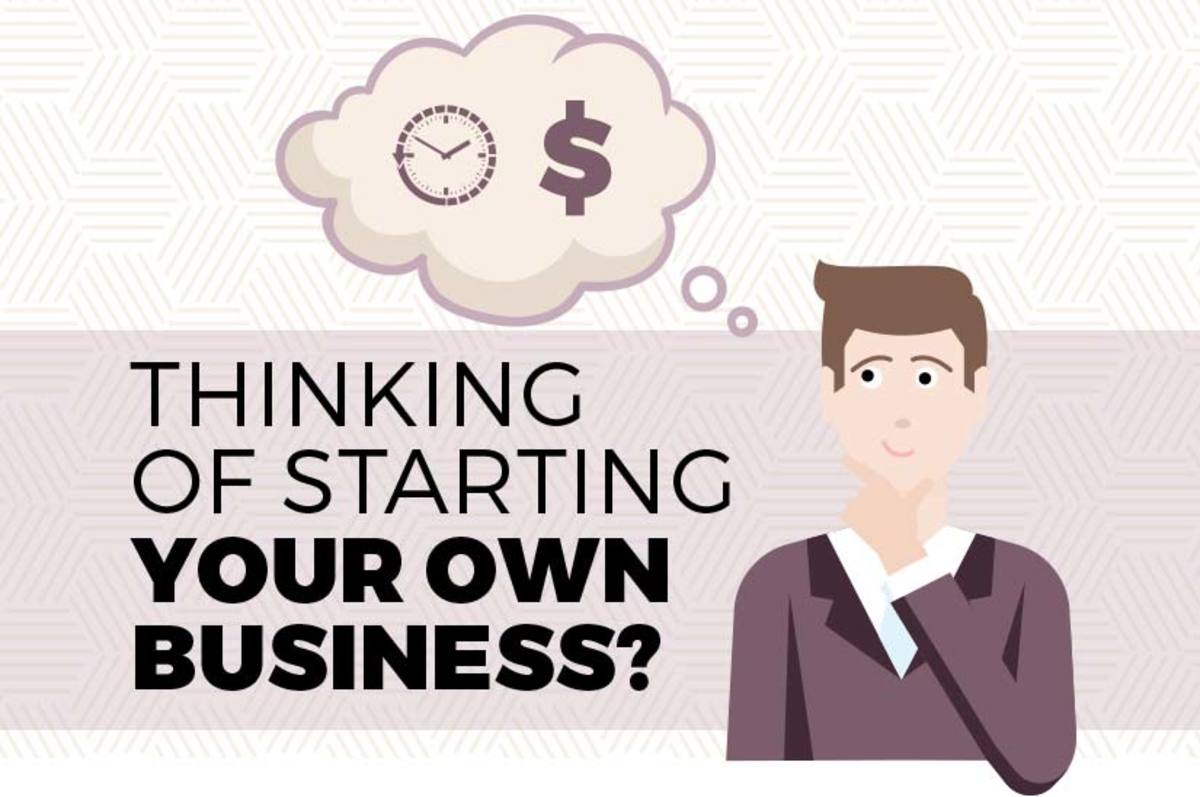- HubPages»
- Business and Employment»
- Small Businesses & Entrepreneurs»
- Entrepreneurship
Entrepreneurship and Misconceptions of Failure

The Difference Between Winning and Working
I've seen some folks pull together the statistics of failure regarding entrepreneurial enterprises. They can tell you how many times someone attempted to start a new venture only to have it collapse. They can tell you how many restaurants fail out of how many attempts are made. They can also tell you how little an average entrepreneur makes compared to his publicly employed counterpart. In fact, I believe given the opportunity, more people are likely to offer rates of failure as a basis for not attempting something, anything, that may change their lives forever. One of the most common responses when asking friends or family if the prospective entrepreneur should enter this or that business is "...if it would make so much money, why isn't anyone else already doing it?" Taking the wind out of the sails of many a good plan as unintentional as it may have been.
So what makes the difference between winning and working? What makes the difference between the entrepreneur and the employee? Sometimes it is just the lot we draw and from that the decisions that are made for survival. Other times, it is a choice that is made by those who can and when they want to under the terms they decide. Neither start up is more destined for success or failure based on the reason for the start. I believe the fire in the belly or the need being fulfilled is the determining factor on success or failure.
Starting Small
When given the opportunity, bootstrapping (starting from scratch using one's own finances) your own business is a great way to start. You hear of all kinds of successful business start-ups that began in a garage or basement. It really doesn't matter if it is a product being manufactured or a service being performed as far as what kind of business. It tends to be manageable and can occur while you are also employed outside the business while it is taking on a life of its own. The point is you aren't paying additional rent or buying an additional building to get started. Since that can be on of the largest burdens on a business start-up, keeping the costs to the minimum extends the financial potential for success.
Starting your business from your home doesn't come without some limitations though. Obviously regulations or local laws, even home owner association requirements, may limit what can be done from one's own home. Space limits are something to consider - as well as resources such as either power or even internet access or the number of phone lines can limit what you can do from your garage. There can also be insurance restrictions as to what you can do within your home - and that doesn't just limit manufacturing but it could be the value of computers or servers you have on hand may exceed your homeowner's policy. Also, if you start employing people working in your home - that probably doesn't exempt you from workers compensation insurance or similar dues related limits depending on where you live.
The upside is significant enough that it overcomes a lot of these issues. Conditions in my town right now are such that it is very favorable to the entrepreneur for rent. Many, many buildings are setting empty and insurance for that empty building are actually higher than if someone was occupying the same location - so great deals on space are available. 6-9 months of free rent are common for warehouse with limited office space. Keep in mind this usually does not include power, water or other utilities and you still need to buy renter's insurance.
Even though you start small, it does not relieve you of keeping track of what you are doing - not only for the tax implications but to be able to evaluate what you want to do to see, if on a larger scale, if it possible to make money. Keep track of all related expenses including travel to buy supplies, costs of supplies and any travel to and from sales opportunities - or cost of internet connection if you are marketing through the internet.
Scaling
I know a man who trades in the hundreds of millions of dollars of products every year - from his basement. He has one assistant and two phone lines. The assistant handles all the paperwork after he generates sales and all sales are done via purchase orders. They also contract their hauling of product between end users and he would only make less money by moving into an office outside the basement. He has a small inconvenience of his assistant coming to his home everyday - as that is her office. His wife also did trading of commodities for several years - actually only one commodity and only for one company (coffee for Delta Airlines). But her one annual contract once traded was enough for most families in America to live on the highest rung of the ladder!
I know of a local man that started a software company in his garage. It is now used in dozens of banks in the region. Another guy builds fishing lures in his garage. He uses a group of adults that are limited in their abilities to do some of the sanding and finishing steps and produces quality wooden lures - and some special people get meaningful employment they probably couldn't get otherwise. It is a great business plan and he has been amazingly successful from it.
Finances are both the fuel for beginning a business and the most common downfall for the business. By starting small, the entrepreneur must first analyze just what portion of her current income she can commit to the venture. Of course better yet is that a budget was put in place earlier on that filled a pot with cash to operate from. Speaking from experience, don't start anything without a significant pot to pull cash from to begin with - if possible. Make it a policy that you never exceed your cash capabilities while in start-up mode. When scaling up, it may be necessary to bring in an investor for more money - or use more of your own savings to do so - but try not to borrow money that has to be paid back to move forward. Make borrowing your last resort. In fact, if you aren't making money on the scale you are working from in your garage - what makes you believe you will make money if you borrow a ton of money so you can do everything bigger?
I once had a friend who was in the dairy business. BMW was considering buying 600 acres of land from this old farmer. The local news media came to his farm one day and asked the question of Mr. Jack, "what will you do if you sell 600 acres to BMW? We understand they are offering $20,000 an acre - that would mean millions of dollars to you!" Mr. Jack just looked at the reporter, turned his head spitting out some tobacco then back to the reporter and said, "I reckon I'll just continue dairying until all the money is gone." There is a lot of truth, and quite a bit of sarcasm in that statement, but probably was lost on the reporter.
Most folks would see a dairy as a money losing venture. Mr. Jack had started small on 40 acres and only 10 cows. Over the years, Mr. Jack had added a few cows along and as he could he would buy another acre or two of land. As time went on, he had bought over 2,000 acres of land and had around 500 cows he milked every day - three times a day. If you asked him, he'd tell you he didn't know anything but "dairying." But obviously he was a very smart businessman. Never underestimate the entrepreneur.
I work with a number of companies that have started up as medical device manufacturers. Usually a surgeon sees a better way to perform an operation than what is currently available, designs the fix and files for a patent. I have a company I represent to hospitals that makes stainless steel surgical products - they carry 73 different styles of scissors - all because different surgeons saw a way to improve on a situation. Some more specialized products such as spinal implants or cranial plates may require some special tooling that doesn't make sense to have in a garage - but don't put it past a doctor to consider doing it.
Another point about scale is the market you are considering. If my fishing lure buddy mentioned earlier makes 1000 units a week right now selling them all for a $3 profit - and considers moving into a larger commercial space so he can make 10,000 units a week - does that immediately transfer into $30,000 a week profit? No, not at all. As it is, he knows he has a solid market for 1,000 units a week. He may not have explored all the opportunities out there, but in fact he has a solid following in his neck of the woods. Before he should consider even looking at expanding his production he must know without a doubt the market is there for the product. You wouldn't believe how many companies I have consulted with that when confronted with the decision to expand or not, they don't do the math first!
Sure, new machines can make the widget on a per unit basis much more efficiently. In addition, with the higher volume of products out, there is a higher volume of product in - and that should translate into better cost averaging of raw materials... should but not always. Scarce resources are scarce....right? When you start using more of them, they become more scarce - and more expensive.
If the analysis provides that the widget can be manufactured for less and maintain or improve on quality, and there is a market for the greater volume of available widgets, then is it a no-brainer to make the move? Timing is always a consideration. Why have you been able to sell into the market at the higher cost and still profitably? I know of more than one situation where a plant was not producing at full volume - actually less than half volume - for over a year. The market was strong for the products involved and a number of smaller manufacturers were born that could make products and have a home for the finished goods. Two companies decided to buy expensive equipment and rent larger places, hire several dozen people and scale up to meet the demand. About the time the equipment was delivered and the employees were showing up to begin manufacturing all the new widgets - and about the time the huge purchase of new raw materials hit the door - the old factory was finished with the efficiency program they had been working on for a year. They had been able to cut their cost of production by half - and improve quality by double although it cost them nearly a year of production. Their customers all switched back to the big company overnight from the small manufacturers that had filled the void temporarily. Needless to say, the small manufacturers that stayed small just closed up shop and counted their profits. The ones that bought in to scale up - went broke in a month.
Budget - budget - budget
Talking money to entrepreneurs is just about like talking about financial commitments to church goers. No one wants to broach the subject but it is the most important discussion that can decide a big portion of the success of the business.
Deciding on a budget is quite off-hand to begin with. You don't know too much at the start but with records and some decent bookkeeping, you will soon learn what is costing you money and where you can and cannot save money. Working on the budget as much as you work on the new design will only become a good habit and keep you from overstepping.
Believe in Yourself
I saw a statistic recently that indicated less than one percent of Americans, and less than one-half of one percent of Europeans, were inclined to being entrepreneurs. If you think about that for just a minute or two - it makes perfect sense. About one in two hundred people decide to start a business. Look around sometime...I'm thinking you can quickly eliminate half of the population just based on stupid...sorry, I'm not very politically correct. Throw in another 25 percent that are happily employed or at least have jobs. 10 percent don't have a job or don't intend to. Fourteen percent are retired. Half a percent are too sick to work...the other half percent are entrepreneurs. Thank God for that half of one percent. In the United States that would provide about 1.6 million entrepreneurs in the United States alone. That is 32,000 entrepreneurs per state in the US.
These people must believe in what they are doing is a good thing. They must believe that if they don't do this work, it won't get done or that by doing this work they make some money or improve their life or the lives of others. They cannot fall victim to the nay sayers that cannot see their vision or recognize the opportunity. "If there was a need for that gizmo - someone would already have made it." Really? I guess that is what was going on in Bill Gates garage.
Winning
Before Charlie Sheen claimed this word as his own, it had a great amount of value. The main point in business isn't just winning - but also keeping score. You need to keep score so you know where you are falling short and what are your strong points. Winning is an attitude and a presence of mind that motivates employees, bankers, investors and customers to do business with you.
Entrepreneurial Education
My son graduated recently from Clemson University with a dual degree - Small Venture Creation and Entrepreneurship. Yes, real degree, yes, major university. But is that what is needed now? Sure, to some degree. He is now gainfully employed developing and building new convenience stores and gas stations across Georgia and South Carolina. People are contacting his company every day asking about how they can start or grow their business. So what is it that is missing in our education regarding getting started.
The whole of our education system since the 1800s has been designed that most of us would go to word for a few of us. It isn't designed to teach the concept of creating wealth - only working for someone else. That isn't all bad - someone has to do the work - but someone has to have the vision, the design, the drive to create a business where everyone else gets to draw a check.
That is where I am now - and I want others to join me. We are creating a new medium intent on getting our families, friends, communities, and economy working again. We can't wait until the election to get rid of this incompetent administration - we must begin to act now - so when these guys are gone we will be in the position to blow the doors off. Let's get back to work - let me know if you are interested in working with me to do so.
The Inventurist









